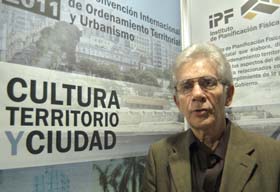
Havana, Monday, November 7, 2011. Year 15 / Number 309
Culture and Discipline: key factors
for sustainable urbanization
Livia Rodriguez Delis
A culture of urban planning is essential to safeguarding our heritage
and our use of space.
A CubaNews translation by Karine Poznanski
 Architect Miguel Antonio Padrón Lotti, Executive and Scientific
Secretary, XIV International Convention on Regional and Urban Planning
Architect Miguel Antonio Padrón Lotti, Executive and Scientific
Secretary, XIV International Convention on Regional and Urban Planning
Neighborhood, provincial and national planning is
imperative, affirmed Miguel Antonio Padrón Lotti, Executive and
Scientific Secretary of the XIV International Convention on Regional and
Urban Planning, recently held in Havana.
In referring to culture in land-use planning, we mean protection of the
natural public environment, noted the expert. We are all responsible for
following the rules of urbanization and construction in a disciplined
way. There is a national debate at present on the issue of urbanization
and this is where the idea of sustainable cities fits in. Environmental,
economic and cultural factors shaping the developments in Cuba are a key
aspect of this debate. In Cuba, 76 % of the territory is urbanized.
According Padrón Lotti, special attention needs to be paid to the rural
sector due to its link to food security.
“Cities need to be built that improve the quality of life for people,
and instead of being a blight, produce beneficial results; cities that
do not “eat up” (sprawl over) the outlying areas, which should be used
for agriculture.”
He says Cuba is a country where the social victories are tending
to get old; the concept of neighborhood needs to be reframed, not just
in terms of children’s playgrounds, but also public spaces for seniors.
A city that expands outwards increases infrastructure costs; more people
have to travel longer distances to get to work; more energy is used in
pumping more water. It is also necessary to assess the distribution of
the services among various cities, noted the expert.
He pointed out that one of the challenges now facing the country is to
first use up the existing potential in the cities. The aim is to grow
inwards as much as possible, but not to the point of overcrowding;
cities can be maximized while safeguarding public areas and green space;
it’s just a question of organization.
“This first step has to be taken with the question of housing so that
the focus is on areas where there is capacity for infrastructure, where
there is a possibility of change towards positive use.”
Padrón Lotti made it clear that a drive towards construction of housing
by individuals will involve the urbanization of new areas, the reliance
on the necessary approval of the Instituto de Planificación Física
[Cuba’s national planning institute] and other authorities. A building
cannot be constructed where there is no water system, electricity or
waste disposal.
For this, an urban planning perspective is required, the specialist
emphasized, as well as calling on the many specialized fields to ensure
that the process goes smoothly.
|